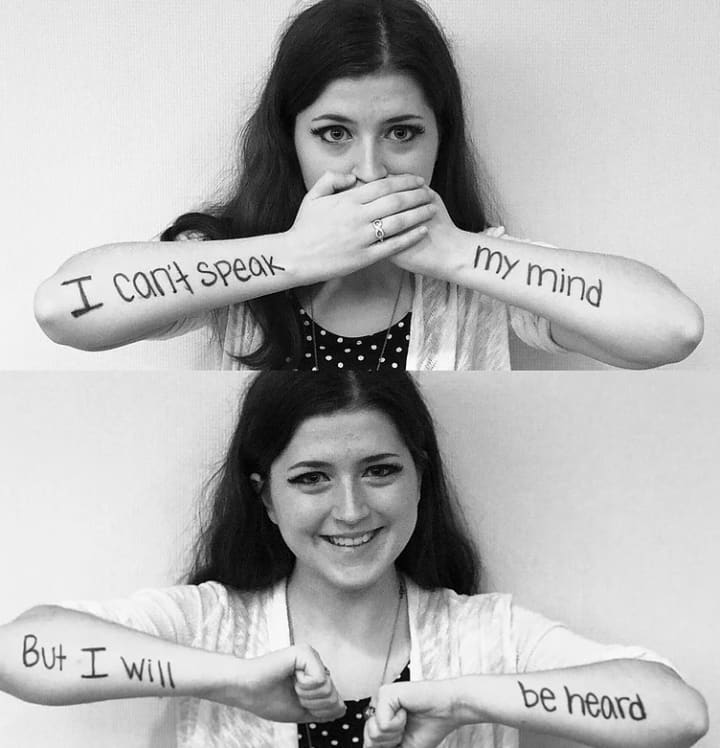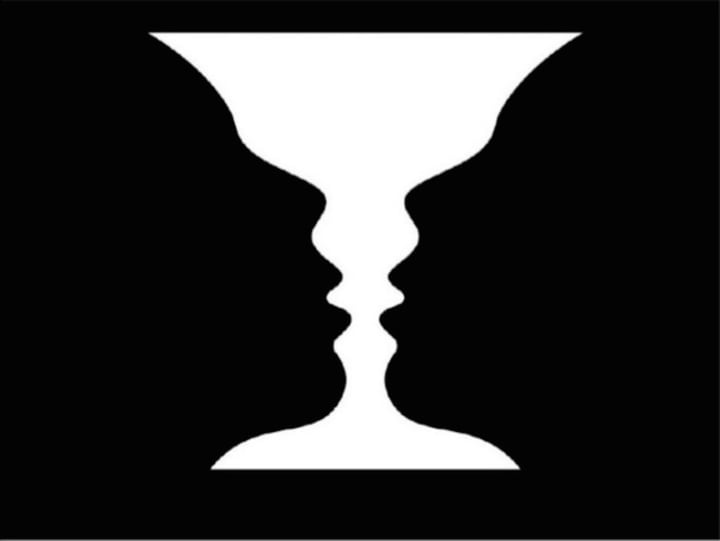Optical Illusions
My struggles with body dysmorphia.

During the spring semester of my freshman year, a friend named Sophie convinced me to attend meetings held by my college's Hillel Society. I am not Jewish, but since I was friendless and didn't have anything better to do, I came to the miniscule meetings where the club watched films on Judaism and ate kosher pizza. Born and raised Catholic, I felt like an intruder. But people welcomed me, and for a few weeks, I was less alone than I was before.
One afternoon, the club got an organization called The Turn It Around Project to hold an assembly. It's a body art and photography group that takes the negative thoughts of their subjects and "turns them around" by writing a positive affirmation on their skin. Not only does the subject consent to photographic expression, but a promise to change their thinking patterns.

There were about ten of us sitting in metal chairs, all in a circle - like one of those social groups addicts or grieving people go to when recovering.
"So first, we're going to talk about our fears, our past...anything that worries you," said Abbe, the founder of Turn It Around Project. She came to our school with Crayola markers, a fancy camera, and a powerpoint showing off her portfolio. Her Turn It Around self-portrait were the words, "I am not perfect," on her bare back, and then on her chest, "but I am enough."
We had already broken the ice by stating our names and grade level. I wasn't 100% keen on attending that day, but I wanted to show support to Sophie, who was so excited to bring Abbe in after several weeks of email correspondence.
"Who wants to start?" Abbe asked, looking around the circle. I crossed my legs and kept my head down, but since I was in her line of sight...
"Katy! Why don't you go first?"
Everyone's head turned in my direction. Gulp. I nervously clutched the ends of my blue Harry Potter tank top and nodded. It felt like there was an invisible spotlight on me. Fortunately, I didn't have to think hard about the past trauma which dominated my thoughts, because it ended only four months prior to me sitting in front of this group.
"So. I had this thing for seven years called an underbite..."
I gave the typical song and dance I've given in countless memoirs, therapy sessions, and even Vocal articles. From age twelve to eighteen, I lived with a class III malocclusion - where my bottom jaw protruded out like a bulldog's. It was all because of a rapid growth spurt I had when I was a pre-teen. There were chewing problems and choking and bullying from teen boys and every day, the sides of my face would snap, crackle, and pop from TMJ. Then, in December of 2016, corrective surgery changed my face.
People nodded along with my pain. The typical reactions: oh my god, that's terrible. I'm so sorry. Good for you for being patient.
But what I avoided telling the group, and what I've avoided talking about until this story, is the terrible mental self harm my body dysmorphia made me commit. And ironically, it involved body art.
Before I got into real self harm - y'know, the nasty kind that involves slicing your skin open and hiding the evidence with a shirt sleeve - I used to harm myself with a black Sharpie marker. I didn't just use it on my wrists, but across my chest, on my neck, and down my arms and stomach.
When you suffer from body dysmorphia, you constantly "check" yourself. It's not normal checking like looking in the mirror to make sure your hair is in place, but long, anxious bouts of staring at the parts you don't like. Wishing they were different. Making sure to see if they are especially noticeable that day.
In my case, I would try to fix the problem. Using the palms of my sixteen-year-old hands, I'd push my lower jaw back for minutes until my chin burned bright red. The intention was to try and break my bones, or at least stop my jaw from growing any longer. Eventually, I realized it only made my TMJ worse. As I stared at my reflection in my bedroom mirror, I wondered why I had to live with a disfigured jaw while everyone else I knew looked like a normal human being.
There was nothing I could do on my own to fix the disfigurement and get my old face back. My parents said they didn't have enough money for corrective surgery. I wasn't old enough to get the procedure anyways; I'd have to wait at least two more years, when my bones stopped growing at age eighteen.
I remember crying for help several times. It was like being lost at sea with no boats around to see you floating alone in the ocean. A friend told me I shouldn't worry about my so-called deformity because "God doesn't make mistakes." It's not like you've lost a limb or have to get an organ transplant, people would say. My father yelled at me once for stressing about my underbite because he lived with a hernia for several years, and still needed surgery for it. I had never known about the hernia until he told me. Basically, he argued his pain was greater than mine.
I took those responses like salt on a wound. Was I crazy? Was I overreacting?
I wish I could go back in time and tell my younger self she wasn't. Of course I had reason to fret - my face wasn't my real face! When people pay attention to you, they look at your face. It holds your brain: the thing that makes you human. When you remember friends and family, you don't specifically think of their arms or legs or torsos. You think of their face first. Your face is the thing people use to identify you. It's a unique area that separates you from everyone else. So my reasons for worrying what others thought of my face were valid.
But because I did not receive the emotional support I needed the time I needed it the most, I was fully convinced I was a lunatic. When I looked in the mirror, it was like my eyes saw someone no one else could see. In my opinion, body dysmorphia is all about perspective. It's not like you're actually seeing a magnified nose or a bloated stomach when you're gazing at your reflection. You are looking at yourself as you are, but only focusing on the things you don't like.
It's kind of like that optical illusion with the white design on a black background - the one where you either see a chalice or two faces first. Those suffering from BDD can only see the chalice, while those without BDD can see both the chalice and the faces. Others can see the full picture of their appearance while you're relegated to one part.

Anyways...because I felt alone in my pain and couldn't cope, I felt the need to punish myself. In my mind, all the compliments people gave me were lies. I took a black Sharpie and wrote words like monster, ugly, different, and phrases like, "no one will ever love you," all along my chest, down my stomach, and across both arms. I'd cry while looking at my reflection, put clothes over my inky collage of negativity, and go about my day.
The words wouldn't disappear until I washed them off in the shower. I'd find traces of black along the rims of bras and insides of t-shirts. It's what I felt on the inside marked on the outside. It was a reminder of my unworthiness It was a form of self-expression - albeit a very negative one.
The Sharpie self harm didn't stop until I sought out therapy, then corrective surgery. However, while the words are gone for good and long periods of staring at my reflection have become far less frequent, I don't think the intense feelings I mustered while struggling with body dysmorphia have completely left. In a way, I don't think they ever truly do.
I hate to write this, especially with how political everyone is these days...but when you fit into conventional beauty standards, people do treat you better. It's a sucky fact of life. When I got my new face after surgery, I noticed so many changes in the way people behaved towards me. It was little things. People looked at me more attentively when I spoke. No longer was I "cute" or "enthusiastic," but strangers now used words like pretty, beautiful, and gorgeous to describe me. Boys from high school who ignored me now slipped into my DM's whenever I posted a selfie to Instagram. There was more career success in my life. I even experienced catcalling on the streets of NYC - something that never happened when I walked around with an underbite.

The sudden change in peoples' nature was a culture shock for me. Outside I looked different, but on the inside, I was the same shy little girl who believed she needed to keep her head down. It was like living two different lives at once.
Sometimes I feel guilty for changing my face. My surgery was not for cosmetic purposes: it was needed to alleviate my jaw pains and chewing problems. But a huge cosmetic change was certainly part of the operation. The whole process has made me recognize the flaws of "pretty privilege." I hate how conventional attractiveness can affect our opportunities and happiness in life. Tiny waists and sculpted cheekbones don't equate to trustworthiness. After all, doesn't racism partly stem from people's preference of certain skin colors?
I've grown more confident in my appearance since the early days post-operation, but when I was sitting in that circle for the Turn It Around Project, I still felt a disconnect between my body and mind.
"So, I don't know...maybe it's just because I have a new face?" I said, wrapping up my speech. "But I feel like my body dysmorphia is still there. I wish people looked at my talents and strengths rather than my face."
Abbe nodded, "Well, I think you've got your photo slogan right there. It's what's on the inside that counts, right? At least you realize that. You can't change how others see you, but you can change how you see yourself."
After everyone else in the circle shared their fears, Abbe took a marker and began to write on people's bodies.
"Is it okay if I write on your face?" she asked when she got to me. "I've never done it for anyone before. But I feel like your story is so specific to your face, it's the only place I can write your slogan."
I agreed, and we came up with the appropriate sentence. The words, "I struggle with my reflection," went on my right cheek, and the words, "so I find beauty from within" went on my left.
Abbe had me pose in front of a white backdrop. For the right cheek, I was told to look solemnly down at the ground. For the left, I gave a hopeful smile. The result was an interesting contrast. And yes - it looks like the face and chalice optical illusion.
I'm happy it was one of the first photos taken with my new face. I didn't realize it then, but that photoshoot was the beginning of a new chapter in my life. The Turn It Around Project helped me change my thought patterns when it came to anxiety about my face. For once, I wore words on my body openly instead of privately. And the message was far more positive.
Sometimes I catch myself staring at my reflection for a while. Gazing at my chin, wondering if my nose could be shorter...sometimes I don't believe people when they say I look beautiful. I don't think there will come a time when I'll fully appreciate my body, especially as I get older. But there's solace in knowing my body is just a shell to carry the real me inside. Perhaps I fixate on little things, but I am healthy and have a body that works pretty well. And that's all that matters.
Like diseases, there is no cure to body dysmorphia, but it can be treated. It's just a matter of changing your perspective. xxx
____________________________
Make sure to follow the Turn It Around Project on Instagram! And if you'd like to reach out to me, you can find me on social media @katyisaladybug. Make sure to give this story a like if you enjoyed! I appreciate all the messages I've been getting since How To Win A Vocal Challenge and my recent Creator Spotlight. Y'all are the best. :)
As always, thanks for reading! Until the next article.
-Katy
About the Creator
Kathryn Milewski
Insta: @katyisaladybug
Also a blogger at Live365.com
Playlists, memoirs, and other wacky pieces.







Comments
There are no comments for this story
Be the first to respond and start the conversation.